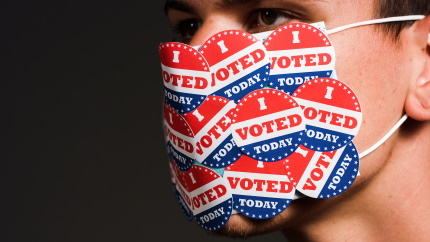In the immortal words of the great Nigel Tufnel, the noise is getting ready to go up to 11.
The first of the presidential conventions is in less than two months—the Republican meeting in Milwaukee starts on July 15th. The Democratic convention will be in Chicago starting August 19th.
The political noise surrounding markets and the economy is going to start to rise and eventually reach almost maddening levels.
This happens every four years, and everyone gets all worked up about how the markets will do under one political party or the other.
Here’s the truth about that, and how to invest accordingly.

The truth is that the results under the two parties tend to even out over time.
Markets do best when there is gridlock and fare worse when one party has complete control of Washington, DC.
If the noise seems louder this year, that is because it is going to be much louder.
The noise has been rising consistently as the use of the Internet and social media has continued to grow.
As much as I like the endless benefits of our modern world, it regrettably gives a megaphone to everyone who has an opinion and thinks the world needs to hear it.
The fact that there are thousands of news outlets desperate for coverage further increases the decibel level.
Worse of all will be those who are screaming that you must take certain steps with your investments RIGHT NOW before the opposition destroys your net worth and your family leaves you alone, broke, and destitute, with only your dogs and your broken dreams for business.
As soon as you fall asleep, according to the instant politically-driven stock market experts, even the dog will slink away if you do not act IMMEDIATELY.
The only action you need to take in response to most of these outbursts and commentary is to ignore them.
Warren Buffett is said to have fairly strong political leanings and has been known to put his money where his mouth is.
How much attention do you think he gives to politics when making investment decisions?
None.
The quality of the business and the price of the stock are the major factors he considers.
I have been fortunate enough to get to know a lot of folks who make their living in the futures and options markets, both on and off the floor.
Some of them regularly take positions that would cover the cost of operating some small countries. Others are trading 20 markets or more every day.
How much attention do you think they are paying to the daily political news as part of their trading preparation?
None.
It is all data, math, and trend.
While it is true that politics will influence the economy at some point, that influence will eventually show up in business fundamentals, market trends, and prices.
Until it does, it does not matter for investing and trading purposes.
What does matter? What is cheap?
Small banks, real estate, energy of all kinds, and small stocks.
What is expensive?
Tech, consumer necessities, and money-losing story stocks.
What is trending higher?
Stocks are for now, although there are signs of exhaustion developing.
Commodities, which is not good news for Jay Powell and the folks at the Federal Reserve.
What is in a downtrend?
Bonds and natural gas.
These are obviously small sample sets, but you get the idea.
How you use this information depends on your mindset and time frame.
A trader might want to be long stocks and short bonds.
An investor might use the same information to avoid tech and consider buying fixed income.
If the election results impact assets, companies, sectors, or markets, it will show up in value, fundamentals, and trends.
Until that happens, all the noise surrounding the election should be avoided when investing and trading your cash.
Leave the noise, drama, and emotions of elections and politicians for after-market hours.
Better yet, do what I do and treat that whole side of life like the low-brow theater that it has become.
The ETF Strategy Built for a Trade War
If you’re just sitting on income from your ETFs and hoping for the best… Stop!
Tim Plaehn and Jay Soloff reveal a smarter way to use monthly ETF cash flow to protect and grow your wealth in a volatile market.





